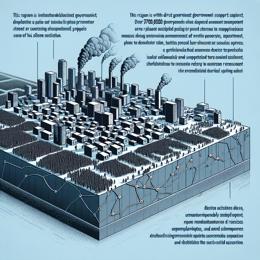Content created by AI
Zimbabwe to Receive Vital Aid as Russia Donates Thousands of Tonnes of Fertilizer
In a significant development, Zimbabwe is set to receive a year's supply of fertilizer completely free of charge from Russian fertilizer producer Uralchem. The announcement comes at a crucial time when Zimbabwe, along with other countries in the region, faces the risk of grain shortages attributed to prolonged adverse weather conditions.
The impact of climate change has been particularly harsh on the Southern African region, with irregular rainfall patterns and droughts causing a substantial drop in agricultural productivity. This unsettling trend has the potential to push as many as 20 million people into starvation by the early part of 2024. Zimbabwe, heavily reliant on agriculture for its food supply and economy, is consequently bracing for echoes of famine without international assistance.
Uralchem's gesture involves a contribution of 23,000 tonnes of potash and compound fertilizers which were previously stranded in Europe due to logistical complications. Recognizing the African continent’s burgeoning hunger crisis, the Russian firm has redirected these resources to several African nations in need, with Zimbabwe benefiting from the donation inclusive of all shipping costs.
Zimbabwe's agricultural sector is predominantly composed of smallholder farmers who lack the financial ability to compete with larger corporate farms in acquiring essential farming inputs, notably fertilizers. The soaring costs of these inputs on the international market, compounded by limited availability, have made it increasingly challenging for these farmers to maintain crop yields.
The intervention by Uralchem will undoubtedly provide a substantial boost to Zimbabwe's agricultural sector as it battles to evade a serious food crisis. The donated fertilizers will enhance soil fertility and crop nutrition, hopefully increasing yields and stabilizing food availability not only within Zimbabwe but potentially extending to the neighboring regions also facing food security challenges.
Political and economic analysts affirm that this gesture goes beyond humanitarian aid, as it also appears to be a strategic move by Russia to strengthen its ties with African nations amidst ongoing geopolitical shifts. With this donation, Russia may gain soft power influence in Zimbabwe and the broader region, which has historically seen the presence of numerous international powers vying for diplomatic and economic engagement.
Agricultural expertise in Zimbabwe is warning that while this donation is inwardly a victory for food security, the country must invest in long-term, sustainable strategies to combat these recurrent challenges posed by climate change. These include investing in drought-resistant crops, improving water management and irrigation, and diversifying agricultural practices to reduce dependency on volatile weather patterns.
In addressing this donation and the ongoing crisis, there is a call to action for other countries and international organizations to partake in similar initiatives, as many southern African states reel under the impact of climate adversity and food insecurity.
The donated fertilizer is expected to reach Zimbabwe shortly, with the distribution channels and mechanisms to be communicated by the government in collaboration with local agricultural bodies. This donation, though essential, points to an undeniable need for broader, more enduring solutions to the deep-seated issues confronting the agrarian communities that underpin Zimbabwe's food system.



